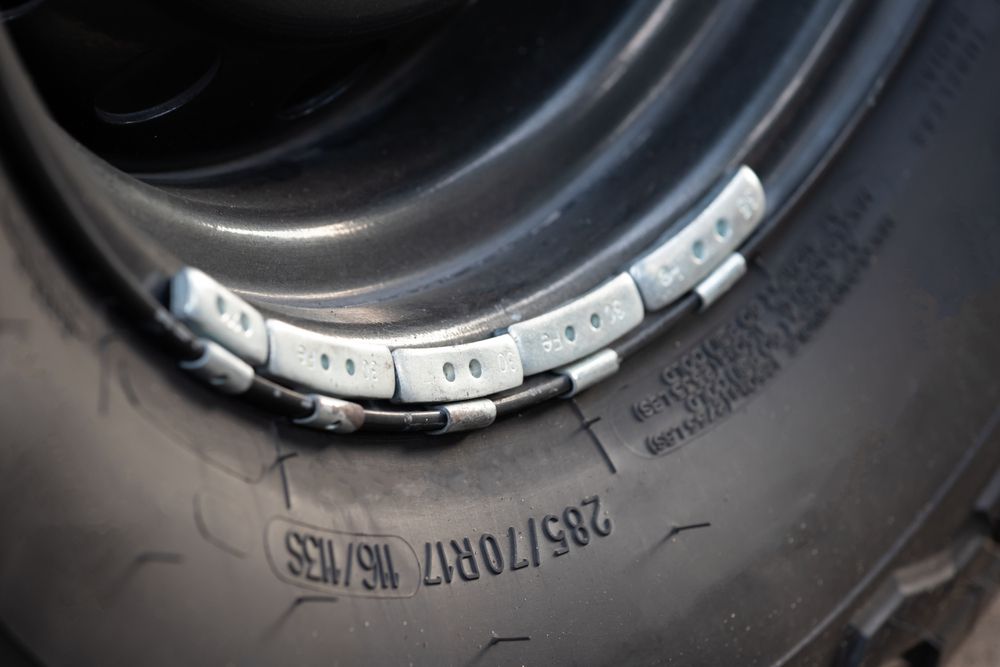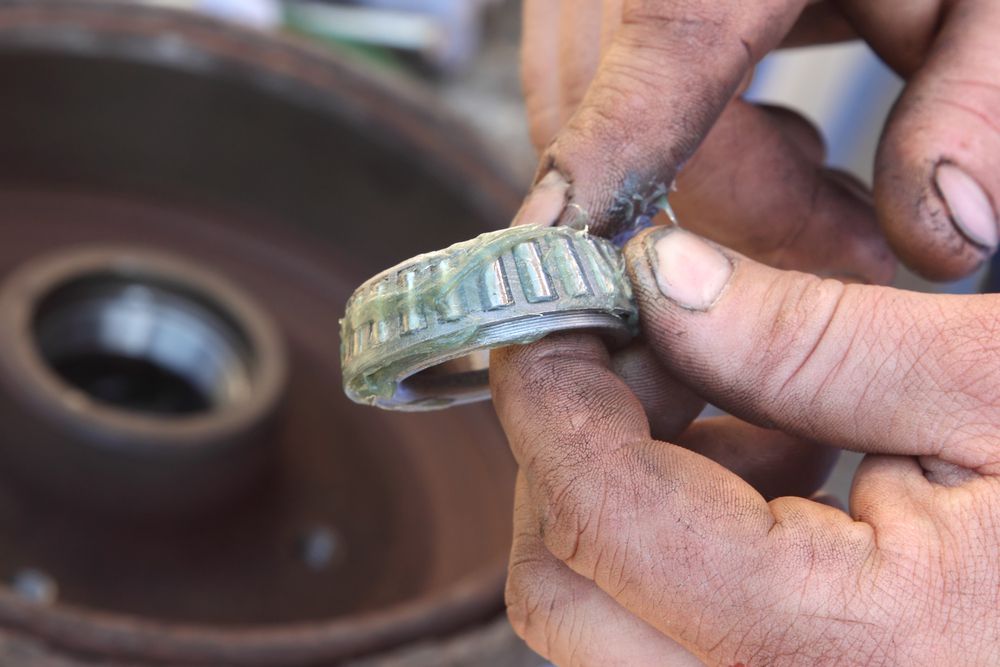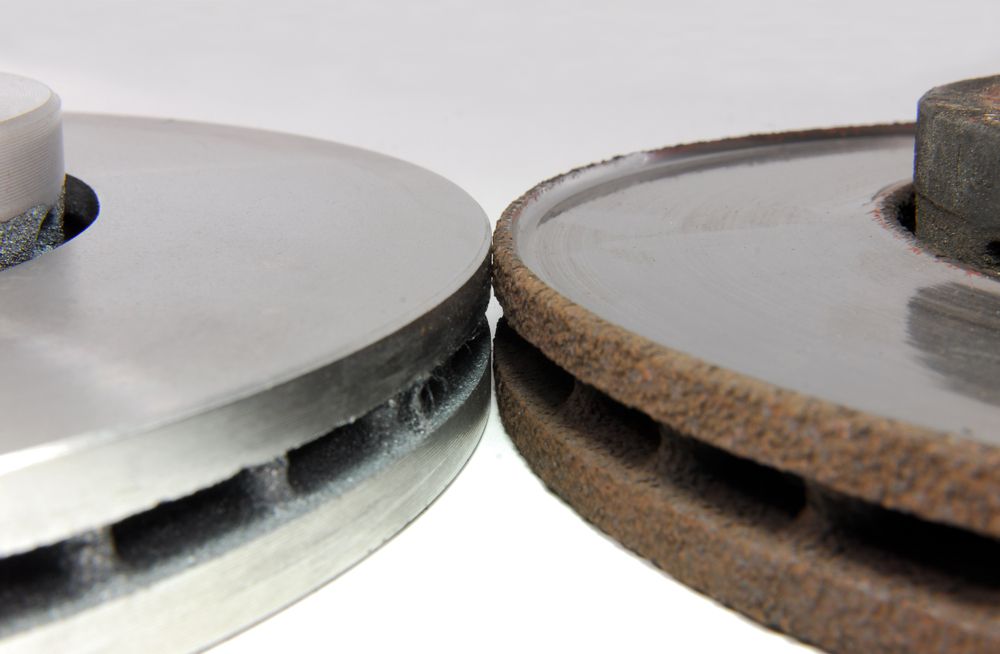Driving with a shaking steering wheel is both uncomfortable and dangerous.
A steering wheel vibration or shaking is a symptom of various mechanical
problems, including problems with the vehicle's brakes, tires out of
balance, brake problems, and worn suspension components.
When a steering wheel shakes, it can lead to driver fatigue, be
distracting, and make it difficult for a driver to maintain control of
their vehicle, so you should fix the problem as soon as possible.
Please continue reading to see what causes a shaky steering wheel and how
to fix it.
 Trying to drive with a shaking steering wheel.
Trying to drive with a shaking steering wheel.
What Does It Mean If My Steering Wheel Shakes When I Drive
A shaking or vibrating steering wheel means a mechanical problem with your
vehicle, usually with the tires or wheels, braking system (brake rotors,
brake pads, or brake calipers), or the vehicle's suspension system.
With some troubleshooting, you may be able to narrow down the cause of
steering wheel vibrations or shaking. Still, the vehicle should be taken to
a professional auto shop to fix the problem, as the problem could worsen
and lead to a serious accident.
1. Tires Out Of Balance
A common cause of a shaking steering wheel is unbalanced tires.
After a tire is installed on a rim, the technician will balance the tire
using small weights that are hammered onto the rim wherever needed.
The weights can fall off, which will cause the steering wheel to shake.
Fixing an unbalanced tire is a relatively straightforward and inexpensive
fix at a tire shop.
Steering Wheel Shakes Then Goes Away
The most common sign that a tire is unbalanced is a steering wheel that
shakes intermittently.
This happens as the vehicle's tires rotate; they will alternate between
being balanced and unbalanced with the other tires on the car.
 Balancing weights on a tire.
Balancing weights on a tire.
2. Bad Wheel Bearings
If the
steering wheel only shakes while turning, it could point to a bad
wheel bearing
.
A wheel bearing in the wheel hub allows the wheels to rotate while
connected to the vehicle's suspension system.
A failing wheel bearing can lead to catastrophic consequences like a wheel
falling off the vehicle, so you should fix it as soon as possible!
Symptoms of a Bad Wheel Bearing
Signs of a bad wheel bearing include a shaking steering wheel and groaning
or grinding noises that increase as the speed of the vehicle increases,
loose feeling steering, or maybe an ABS sensor failure.
Troubleshooting A Bad Wheel Bearing
Diagnosing a bad wheel bearing involves a couple of steps:
-
First, take your vehicle out on a deserted road and listen for a
grinding or groaning noise that increases or decreases depending on the
vehicle's speed.
-
Second, if it is safe, try listening for noises that increase while
quickly changing lanes. When quickly changing lanes, the vehicle's
weight will shift, increasing the load on the wheel bearing on the
opposite side of the direction of the lane change. So, if you make a
lane change to the right lane and the noise increases, it points to a
problem with the bearing on the left side of the vehicle.
-
Thirdly, you can raise the vehicle, firmly grasp the wheel in the 3 and
9 o'clock positions, and wiggle the tire violently in and out. There
will be very little play in a wheel with a good wheel bearing.
-
Finally, while the wheel is raised, you can spin the tire and listen
for grinding noises coming from the wheel hub, which would signify a
bad wheel bearing.
 A mechanic greasing a new wheel bearing.
A mechanic greasing a new wheel bearing.
3. Problems With Braking System
Another common cause of a
shaky steering wheel is problems with the
vehicle's brake system
, such as warped brake rotors, worn brake pads, or a
malfunctioning or stuck brake caliper.
What Causes Steering Wheel To Shake When Braking?
If you notice steering wheel vibrations or shaking when you press down on
the brake pedal, you have a problem in your vehicle's braking system, which
could include:
-
Warped brake rotors: brake pads press against the rotor to stop a
vehicle by creating friction. If the brake rotor is wavy, it will lead
to vibrations while braking.
-
Worn or new brake pads: overly worn or brand new brake pads can chatter
and shake the car.
-
Malfunctioning brake calipers: a malfunctioning or stuck brake caliper
due to corrosion or debris buildup could engage intermittently, which
may cause the car to shake while driving.
Steering Wheel Shakes When Braking At High Speeds
Braking at higher speeds puts more load on the brakes versus braking at
lower speeds. This leads to more vibrations at higher speeds due to warped
brake rotors, worn brake pads, or malfunctioning brake calipers that may
not be noticeable at lower speeds.
 A new brake rotor vs. an old worn brake rotor.
A new brake rotor vs. an old worn brake rotor.
4. Worn Suspension Components
Components in vehicle suspension systems can cause shaking that you could
also feel in the steering wheel. Parts like tie rod ends, ball joints, and
parts in the steering rack like a worn-out bushing.
Can A Bad Alignment Cause Steering Wheel To Shake?
A bad wheel alignment could cause a steering wheel to shake, but it's more
likely to cause the vehicle to drift on the highway, making it challenging
to maintain a straight line.
5. Improperly Inflated Or Worn Tires
A deflated tire will cause the entire vehicle to shake, which you will feel
in the steering wheel.
If your car tires are worn unevenly, you may feel a slight vibration in the
steering wheel.
6. Loose Lug Nuts
Loose lug nuts will most definitely cause your steering to shake, often
quite violently, and need to be fixed immediately as your tire is at risk
of falling off!
Steering Wheel Shakes At High Speeds?
Steering wheel shaking is often caused by a rotating component, such as a
wheel or driveshaft, that is out of balance. The faster the vehicle goes,
the faster the unbalanced part rotates, which amplifies the shaking or
vibration you feel in your steering wheel.
It is common only to feel the vibration or shaking from an unbalanced wheel
at higher speeds, while the shaking is muted or unnoticeable at lower
speeds.
Steering Wheel Shakes At 60 MPH
As mentioned above, if you only start to notice your steering wheel
vibration or shaking at 60 MPH, it is most likely due to an unbalanced
wheel. At lower speeds, the unbalanced wheel may not rotate fast enough to
cause a vibration, but as you speed up, the wheel turns more quickly,
increasing the severity of the shaking.
Steering Wheel Shakes At 70 MPH
A slightly unbalanced wheel might only be noticeable at higher speeds like
70 MPH or higher. This is because the wheel won't spin fast enough to
notice the vibration or shake at lower speeds.
Steering Wheel Shakes At Low Speeds?
When a steering wheel shakes at low speeds, it could point to a more
serious problem than if you only notice the shaking at higher speeds.
A steering wheel that shakes at low speeds then worsens significantly at
higher speeds could mean that you have a wheel out of balance or a problem
with your driveshaft, such as a bad u-joint.
If the shaking does not worsen significantly at higher speeds, you may have
a stuck brake caliper or a problem with your suspension system, like
a bad ball joint
.
What Causes Steering Wheel Shake At Low Speed?
If a steering wheel shakes at low speed when a wheel is unbalanced, there
is a problem with part of the steering system, like a bad bushing in the
steering rack, a bad drive shaft, or a u-joint.
 Driving with a shaking steering wheel can cause fatigue.
Driving with a shaking steering wheel can cause fatigue.
Steering Wheel Shaking When Accelerating?
During acceleration, various components in the vehicle are put under a
higher load than usual. This includes the suspension, transmission, engine,
and motor mounts, among other things.
If the car only shakes while accelerating and does not shake while
maintaining a constant speed, it may be a faulty motor mount or a problem
in the transmission as it tries to change gears to accelerate.
Engine problems could also cause shaking at higher engine RPMs when
accelerating the car.
Is It Safe To Drive With A Shaking Steering Wheel?
It is usually unsafe to drive with a shaking steering wheel, and you should
get the problem fixed as soon as possible before it leads to an accident. A
shaking steering wheel prevents the driver from safely handling their car,
can lead to driver fatigue, and could be problems like a bad wheel bearing,
a flat tire, or loose lug nuts, which can worsen quite quickly and create a
serious accident.
How Do You Fix A Shaky Steering Wheel?
The fix for a shaking steering wheel will depend on the problem.
If an unbalanced wheel causes a shaky steering wheel, the fix is a
relatively simple and inexpensive wheel balancing at a local tire shop. On
the other end of the spectrum would be a problem with the transmission,
which would cost you thousands of dollars to either rebuild or replace.
Tire problems like being improperly inflated or worn unevenly can also
cause steering wheel vibrations. If the tires are worn unevenly, a set of
new tires, properly inflated and installed correctly by a professional
mechanic, will solve the problem.
 A mechanic installing tire weights on a tire.
A mechanic installing tire weights on a tire.
Conclusion
If your steering shakes while driving at a constant speed, you will most
likely have an unbalanced wheel. If the steering wheel shaking worsens when
turning, you could have a problem with a wheel bearing. If the steering
wheel shakes only while accelerating, it could be a problem like a bad
motor mount or a failing transmission.
In any case, it is important to get the car looked at by a professional
mechanic as soon as possible.
The above problems can worsen quickly, leading to an increased chance of an
accident or a more complex and costly fix later.